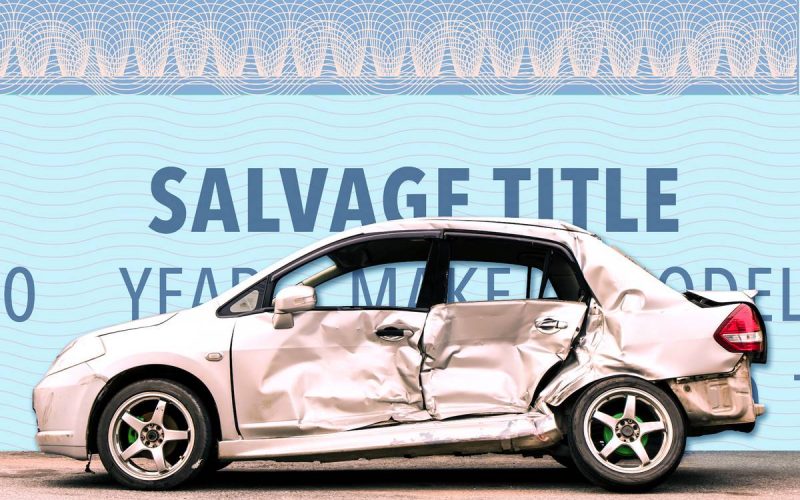A salvage title is a term we’re hearing a lot more of in the used truck market, as weather phenomena like tornadoes, hurricanes, and floods have caused significant damage to rigs around the country. A salvage title signifies that a car has previously sustained considerable damage. If you’re looking for a cheap car, salvage title cars can be a good alternative if you know what you’re looking for though you might not get insurance. It’s not a project for novices or those looking for a trouble-free car.
What is a Salvage Title?
A salvage title usually indicates that a car has substantial damage that is close to or more than the car’s value. While the specific requirements vary in each state, there may be some overlap.
Minnesota salvage title rules, for example, provide that a salvage title is required in each of these scenarios.
- After paying a total loss claim, an insurance company purchases the damaged vehicle.
- The damage to a car exceeds 80% of its value, and the vehicle’s owner is self-insured.
- A vehicle’s salvage title is from another state.
The statutes in New York are identical, with the exception that the repair expenses must amount to 75 percent or greater of the car’s pre-damage market value.
A salvage title car cannot be driven on public highways in several states.
Find out what constitutes a salvage vehicle in your state by contacting your state’s transportation agency or department of motor vehicles.
It’s vital to know that a car can be totaled for reasons other than an accident. Flooding, fire, vandalism, theft, and other severe disasters such as hail storms may also result in salvage title damage, depending on the state.
Various Types of Damage
However, a car with a salvage title has not always been involved in an accident. There are several reasons why a car may receive a salvage title.
- Flood damage: Cars that have been flood-damaged may be given a salvage title. Some jurisdictions specifically mention flood damage on a car’s title, while others just use the word “salvage title.”
- Hail damage: Similar to flood cars, vehicles damaged by hail can obtain a salvage title if the state does not include a specific “hail damage” indication on the paperwork.
- Theft recovery: If a vehicle is stolen and goes absent for an extended period of time, the insurance company will pay off the vehicle. If the vehicle is eventually discovered, the insurance company may sell it to a salvager, who will repair any lost parts. Some states will subsequently provide the car with a salvage title.
- Vandalism: If a vehicle is spray-painted or overturned and enough damage is done, the vehicle may be given a salvage title. However, no state specifies vandalism in the title — only “salvage.”
- Non-Repairable: A badly damaged and non-operational car with no resale value other than its parts might be designated as “non-repairable,” which some jurisdictions refer to as a “junk title”. In these extreme situations, the state will not allow the car to be restored. Also, it must be scrapped or destroyed. “Non-repairable” isn’t a salvage title in and of itself, but it’s crucial to be aware of the term in case you come across one.
The Process of Salvage Titles
Salvage titles safeguard consumers from inadvertently purchasing a car with substantial damage or other issues. Many jurisdictions have laws requiring anyone selling a vehicle with a salvage title to disclose this information. You might not even be able to test drive the car before purchasing it.
The National Motor Vehicle Title Information System (NMVTIS) records salvaged vehicles throughout the car to prevent buyers from buying a salvaged vehicle unintentionally. You can obtain an NMVTIS Vehicle History Report from one of the following authorized data providers:
- Bumper.com
- Carsforsale.com
- Carvertical.com
- Checkthatvin.com
- Clearvin.com
- Titlecheck.us
- Vinaudit.com
- Vindatahistory.com
- Vingurus.com
- Vinsmart.com
Before you can drive a vehicle with a salvage title, it must be repaired and made roadworthy again. Document the repairs so that you may show proof of completion when applying for a rebuilt title. The state inspects your car during the application procedure; if it passes inspection, you are issued a rebuilt or reconstructed title.
If your vehicle has a salvage title, you have three major options. First, you can select whether to keep it, repair it, and apply for a rebuilt title. You can sell it as-is to someone who is willing to restore it. Finally, you can sell the vehicle as scrap to a junkyard.
Is Salvage Title a Bad Thing?
Buying a car with a salvage title can be risky if the car has not been properly repaired or rebuilt. If the car has been restored, states often demand a “rebuilt title” and inspection. This is to certify that it is roadworthy again.
However, your safety may still be jeopardized. If the previous owner fixed the car’s exterior but did not repair critical safety features such as airbags, you could be gravely hurt in an accident.
Even if a car has been entirely rebuilt, it may have been poorly repaired. If there was severe frame damage, you may discover that the doors do not close properly or that the windows do not seal properly.
You should also keep an eye out for “title washing.” Title washing is the unauthorized removal of a vehicle’s branded title status. Dishonest auto vendors may apply for a new title in a different state for the salvage vehicle or omit information on a new title application.
Should You Purchase a Salvage Title Car?
It all depends on how comfortable you are with purchasing a car with a shady history. On the one hand, salvage-title cars can be a good deal if you’re on a tight budget or in need of a backup vehicle. Depending on the vehicle, a salvage-title car can sell for anywhere from 20% to 40% less than the same vehicle with a clear title, according to Edmunds pricing manager Richard Arca. He further stated that when the market demand for a salvage-title vehicle is low, the markdown is bigger.
Some salvage-title cars, on the other hand, may be more prone to mechanical difficulties and have a lower resale value. Binder suggests that consumers do the following three actions to help reduce the chances of purchasing a car that will fail them:
#1. Have the vehicle inspected
One of the most crucial things to do if you’re thinking about buying a car with a salvage title is to have it inspected. Bring a mechanic along for the examination. You might also arrange for the car to be towed to a body shop. A car professional will be able to tell whether the repairs were done correctly and will be able to see any red flags, such as frame damage or pieces that still need to be repaired.
#2. Purchase the vehicle from a respected repairer:
Look for internet reviews of the facility where the vehicle is being sold. Buying a salvage-title car from a shop known for reliable repairs may be less dangerous than buying from someone with no track record.
#3. Request the original repair quote:
The original repair estimate is the best approach to establish how badly the car was damaged. This will reveal which parts were replaced and how serious the accident was – if there was one at all. Perhaps the damage occurred in another way.
Drawbacks of Obtaining a Salvage Title Car
Salvage-title cars can provide challenges when it comes to obtaining a car loan, obtaining car insurance, and reselling the car.
#1. You may be unable to obtain a car loan:
Banks and credit unions are hesitant to make car loans on salvage-title cars. They are concerned that cars that have been deemed a total loss may have decreased structural integrity and will not survive another crash. Another problem is that the cars may require costly repairs in the future that the borrower may be unable to pay for, increasing the danger of repossession. Banks only want to lend money for vehicles that will last the life of the loan, and salvage vehicles have a bad reputation for durability. Banks are a little more lenient when it comes to hail damage, which is frequently more of a cosmetic issue than a mechanical one, but you might not obtain all of the money you want.
You could be better off applying for a personal loan instead of a car loan to avoid being declined.
#2. You would have to put in more effort to obtain car insurance:
According to Lynne McChristian, a spokesman for the Insurance Information Institute, you should be able to obtain the liability insurance required in most states for a salvage-title car that has been rebuilt, repaired, and inspected. Because it has a salvage title, it is riskier to insure, and you may have to pay more than you would for a clean title car. “Keep looking around,” she suggested. “It’s a crowded market.” The pricing for liability insurance is more likely to be determined by your driving record than by the history of the vehicle.
She anticipates that obtaining comprehensive and collision coverage will be more challenging. This is due to the fact that an insurance company cannot be certain that the vehicle meets the same safety criteria as a car that has never been declared a total loss. McChristian speculated, “It might be a claim waiting to happen.”
You will have fewer possibilities for trade-in or resale. “Most franchise dealers would not accept salvage-title cars as a trade-in,” Arca, Edmunds’ pricing manager, explained. “Your only options are to sell it to a private party or an independent dealership – and they won’t pay you anything.”
#3. Determining the vehicle’s worth will also be difficult.
Most car assessment websites, presume a car has a clean title regardless of the condition level you choose. “Even a vehicle in ‘rough’ condition can have a clean title,” Arca explained.
Because you will almost certainly be selling the vehicle to a private party, we recommend that you utilize the price you paid for the salvage title car as a starting point in your sale negotiations. Deduct a couple of thousand dollars if you’ve had the vehicle for a few years. Test the market at a higher price than you want to pay and work your way down until you get the offers you want.
Finally, don’t try to conceal the fact that your cars have a salvage title. If you do, you are committing fraud. When you hand over the title or if the buyer receives a car history record, the buyer will find out. When it comes to cars with a colorful past, honesty is the best policy.
The Signs of a Salvage Title Car
While you should always examine the car history record and have a competent auto mechanic inspect the vehicle for faults, there are some tell-tale signals that a vehicle is essentially a rebuilt lemon and should be avoided.
Look for the following warning signs:
- On the title, most states require direct identification of the car that has been in a salvage situation. Before anything else, request to view the title.
- The paint of the vehicle quickly chips off or does not match the rest of the vehicle (This could indicate an intent to hide damage by the seller.)
- A Certified Automotive Parts Association (CAPA) badge on any car part or component could indicate that it has been repaired in an accident.
- Any misalignment of the wheels could indicate frame contact damage.
- A car door that does not open or close properly could potentially indicate that the vehicle has undergone extensive repairs (and was improperly repaired)
- If the hood of the vehicle is misaligned and does not close completely, it could be an indication of a major collision involving the front and sides of the vehicle.
- If your vehicle’s electrical components don’t operate properly, especially if they flicker on and off intermittently, it could be a sign of major flood damage.
The Essentials of Purchasing a Salvage Title Car
To identify salvage title cars, it’s best to undertake extensive due diligence on a new vehicle purchase. In other situations, dishonest vehicle marketers may lead the vehicle to a state with comparatively liberal salvage car title requirements, such as New York or New Jersey.
This procedure, known as title washing, may conceal defects on a vehicle for sale, costing the buyer extra to purchase the vehicle and resulting in unforeseen auto repair expenditures.
Stop that problem in its tracks with a car history check that includes information on any previous salvage titles related to the vehicle. Vehicle history monitoring solutions, such as Experian’s AutoCheck Vehicle History Report, undertake due diligence for car buyers for as little as $24.99 per report.
If you’re in the “serious” stage of car shopping, take the vehicle to a reputable auto repair before signing on the dotted line. A qualified mechanic knows where to search for potential auto damage, where repairs have already been completed, and how to identify any new or used parts that have been fitted that could indicate that a vehicle has suffered substantial damage and that cheaper parts have replaced original parts.
Alternatively, you can monitor the vehicle’s history using the VIN number, which provides vital information on a vehicle’s history such as how many owners the vehicle had, title and accident history, and odometer readings when the vehicle changed owners. You may check a VIN number via the National Insurance Crime Bureau (NICB) with its free VINCheck service.
Due Diligence When Purchasing a Salvage Title Car
#1. Examine the Original Repairs
Request a copy of the original repair estimate for all work done on the salvage title car from the insurance company. This will provide you with a foundation for determining how much damage the salvage title car has sustained and may allow you to negotiate a lower purchasing price.
#2. Investigate Other Auto Financing Options
Getting a good auto loan deal for a salvage title car is unlikely. That is why you should also prioritize having a large cash reserve in order to reduce the need for vehicle finance.
You could also look into alternative financing options, such as a personal loan or a home equity line of credit, to finance the purchase at a lower interest rate and potentially over a longer period of time.
#3. Look into your state’s lemon law purchase options.
Some rebuilt cars receive a different, state-sanctioned stamp of approval in the form of a “lemon law” used car sale. In that scenario, automakers buy repaired vehicles and resell them on dealer lots. A growing number of jurisdictions have regulations in place that allow a legal remedy for purchasing a vehicle with unsolvable repair issues.
Lemons Laws
Most state lemon laws require a dealer to repair any defects with the car over a set period of time at no cost to the customer or to offer full reimbursement for the costs of such repairs.
If an auto dealer is unable to repair the vehicle within a reasonable amount of time, the customer is entitled to a full refund of the damaged vehicle’s purchase price, based on the state’s lemon law statutes.
Your state’s department of motor vehicles contains thorough information on state lemon laws, including an explanation of salvage titles and how to correctly identify them. Here is a list of motor vehicle departments in the United States, organized by state.
What to Do If You Purchased a Salvage Title Car Unknowingly
If you unintentionally purchased a salvage title car and wish to cancel the transaction, you do have legal options.
To resolve the issue of buying a salvaged title car without prior knowledge, follow these steps:
#1. Contact the Consumer Protection Office in your state.
Your state’s consumer protection office can provide helpful advice on the purchase of a salvage title car and help you seek a refund. Here is a list of all state-by-state offices in the United States.
#2. Seek Legal Counsel
For a list of competent lawyers in your area who handle salvage title car concerns, contact the National Association of Consumer Advocates.
#3. Begin a Paper Trail
Use your “buyer’s guide” to prove that the salvage title car was sold fraudulently. The Federal Trade Commission requires used-car dealers in the United States to offer new car purchasers with a buyer’s guide on every vehicle on the lot, which includes warranty information in the event of a disagreement between a buyer and seller.
You may like to read: Bespoke Tranche Opportunities 2023: Definition and all you need to Know
Salvage Title Car Insurance
While salvage-title car insurance is not impossible, it may be more complicated — especially if you desire full coverage with collision and comprehensive.
Most insurance companies will create a liability policy for a salvage-title car, but they will frequently be hesitant to include collision and comprehensive coverage. For one thing, determining an exact value for a salvage-title car is difficult. A salvage-title car is normally worth 20% to 40% less than one with a clear title, according to Kelley Blue Book (KBB). If you file a claim on a salvage car, you should expect a substantially lesser “total loss” compensation than you might expect from a “clean” car.
The second reason is for your own protection. Salvage cars frequently have hidden issues that may or may not be addressed during the restoration process. Not all builders are truthful, and using corners to increase profits is rather prevalent. Either of these realities can lead to a car with structural and alignment flaws that make driving risky.
If you’re looking for salvage title insurance, here are a few pointers to help you obtain the finest coverage:
#1. Look around.
Because around 20% to 30% of insurers will not insure a salvage-title vehicle, you will need to shop around. Check with your existing insurer to see if they provide coverage. If they don’t, you should go shopping.
#2. Be prepared to undergo an inspection.
Some insurers will request an inspection and evaluation before insuring a salvage-titled car. If you disagree with the assessment amount, you should try to negotiate a larger sum or look for new insurance. Even if an inspection isn’t required for insurance purposes, you should get one nevertheless. Before making a purchase, have a reputable mechanic thoroughly evaluate the vehicle.
#3. Obtain a repair quote.
Obtain the original repair estimate from the rebuilder or the insurance company that totaled the car if possible. This can provide your insurance company with the assurance that all damage has been remedied.
#4. Expect to pay more.
Pricing varies by insurer, but you shouldn’t expect a discount on your rates for a salvage car simply because you got a good bargain on the purchase price. In fact, when insuring a salvage-title vehicle, certain insurance firms would charge a fee of up to 20% of the policy amount.
#5. Consider getting less-than-complete coverage.
Consider purchasing a liability-only policy, which protects you financially if you hurt another person or their property. It will not cover the expense of repairing your own car. With a salvage-title car, obtaining liability-only insurance is easier (and less expensive).
What is a rebuilt salvage title?
A rebuilt salvage title is a designation given to a vehicle that has been repaired and restored to a drivable condition after being declared a total loss.
How does a vehicle get a rebuilt salvage title?
A vehicle gets a rebuilt salvage title after it has been repaired and inspected by the state’s DMV or a designated inspection facility, and is determined to be roadworthy.
What is the process for obtaining a rebuilt salvage title?
The process for obtaining a rebuilt salvage title involves repairing the vehicle, presenting documentation to the state’s DMV that proves ownership of the vehicle, and providing information about the previous damage to the vehicle, and passing an inspection to verify that the vehicle is roadworthy.
What is the value of a vehicle with a rebuilt salvage title?
The value of a vehicle with a rebuilt salvage title may be higher than the value of a vehicle with a regular salvage title, but it may still be lower than the value of a vehicle with a regular title.
Conclusion
Salvage vehicles frequently pose greater dangers than most car buyers are willing to accept. It’s frequently better to avoid buying salvage title cars unless you’re a skilled mechanic or searching for a project car. Most consumers will make the decision based on safety concerns, the possibility of costly repairs, and the difficulties of insuring and selling their car. If you’re thinking about buying a used car, get a vehicle history check and have it inspected by a reputable mechanic.
But what if you adore your destroyed car and refuse to part with it, even though it has been deemed a salvage title car? If that’s the case, keep your eyes peeled for all of the potentially costly options. Insurance companies will sometimes let you keep a totaled car and lower your compensation by the remaining value. However, be prepared to pay a significant repair fee to get your car back in working order. Even so, the car’s worth after repairs will almost certainly be substantially reduced due to the salvage title.
Salvage Title FAQs
Can a salvage title be cleared?
Typically, once a vehicle’s title has been labeled as salvage, it will never be retitled in the manner in which it was originally titled. To remove a salvage title, you must first purchase the car, get it repaired, inspected, and complete the necessary papers.
What's the difference between a regular car title and a salvage car title?
A salvage title indicates that the car is not safe to drive and is therefore illegal in most states. The vehicle is not able to be registered or insured. It also has a low market value and is still damaged.
Can you put full coverage on a salvage title?
You cannot obtain insurance for a car with a salvage title. Salvage title cars are considered a “complete loss” by an insurance company, which means they can’t be registered, driven on public roads, or insured. Regrettably, few insurance providers will provide damage coverage.
- Hail Damage Car: Insurance claims, costs of repair (+top picks for the sales)
- Refinancing A Car Loan: Best Easy 2023 Guide & All You Should Know
- DEPRECIATION ACCOUNTING: Definition, Methods, Formula & All you should know
- eBay Selling Fees: Pricing, Calculators and Best UK Practices
- Chain Of Title: A Comprehensive Guide, Updated!!!






